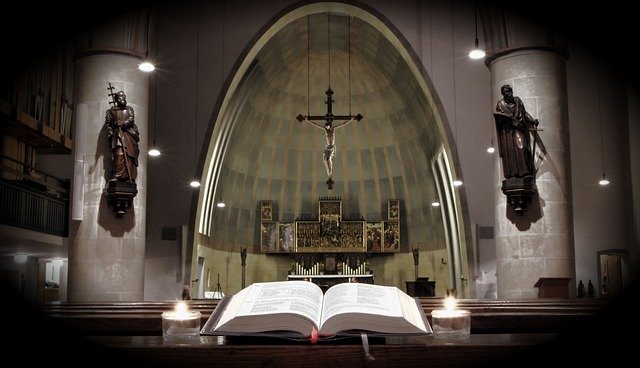 We recently received an email from a PREP catechist who expressed concern about her parish introducing the Alpha program for their eighth grade class. Is this program appropriate for Catholics?
We recently received an email from a PREP catechist who expressed concern about her parish introducing the Alpha program for their eighth grade class. Is this program appropriate for Catholics?There's no simple answer to this question because the Alpha program for Catholics continues to be controversial, for a variety of reasons.
But first, for those who aren't familiar with the program, here's, a little history.
According to the Alpha website, the Alpha program was founded in 1977 by a man named an Anglican curate named Charles Marnham, who was serving at the Holy Trinity Brompton church in London at the time. He created the program to present common Christian beliefs to those who were interested in learning more about the faith. In 1981, another curate named John Irvine, took over the course and created the 10-week format that exists to this day. The program became popular and was eventually taken over by another curate, Nicky Gumbel, in 1990, who developed and expanded the material.
The course tackles essential subjects such as who is Jesus, did He die, why should I read the Bible, how do I pray, how does God guide us. As William J. Cork, D.Min. explains, the course is intended to be a non-threatening way of bringing the Gospel message to people from all walks of life and to leading them into a personal relationship with Jesus Christ. It does so by offering 10 weekly meetings that include a meal, a talk, and small group discussion. There is also a retreat that focuses on the Holy Spirit, what He does, and how to be filled with the Spirit. The retreat includes prayer for the gift of tongues and a Communion service.
Although it sounds fine, its claim to be “ecumenical” is where the story gets murkier, especially when it comes to teaching Catholicism. For example, the Alpha program for Catholics is not a Catholic version of the Protestant program, but is the Protestant version with Catholic teaching tacked on to the end as a supplement.
As Cork writes, “Alpha is, therefore, compatible with Catholic teaching, but does not address the role of the Catholic Church in the proclamation of the gospel or in its teaching on the sacraments. In addition, the current teaching is deficient with respect to Catholic ecclesiology.”
For example, only Baptism and the Eucharist are recognized explicitly in the program, a fact that even Gumbel acknowledges. "Teaching on the sacraments is limited, in the sense that we only teach on Alpha what all the major denominations and traditions are agreed about,” Gumbel said.
The fact that it only focuses on two sacraments and leaves out the other five is perhaps the biggest criticism from the Catholic and the Anglican perspective.
“The Eucharist is presented in Reformed terms as a reminder of a past event, the sacrifice of Jesus on the Cross,” Cork writes. “Gumbel specifically rejects a sacrificial understanding of Eucharist in his discussion of the ‘priesthood of all believers’…”
Even more problematic, Holy Communion is treated separately from membership in the Church. For example, the retreat weekend – which is held halfway through the course – concludes with “communion” – a service that is held before either the Church or the Sacraments are even mentioned in the course.
As Gumbel describes: “We then invite anyone who knows and loves Jesus Christ to receive Communion, should they wish, regardless of their denomination or background. We pass round the bread and drink, asking those who do not wish to receive it for some reason to pass it on to their neighbor. Many comment on the beautiful simplicity and unity in this, and some experience God’s love for the first time as they relax and receive Communion.”
This is highly problematic for Catholics who consider the Eucharist to the “source of summit” of the Christian life.
The course is also criticized for its heavy emphasis on a charismatic agenda, devoting one small paragraph on Baptism and two pages on “Holy Communion” which devoting eight pages to “speaking in tongues” and sixteen pages on “healing.”
It also reduces the gospel to “me and Jesus” with the Church presented as being a mere gathering place for people of faith rather than being the Body of Christ.
The resource list recommended by Alpha also includes Bible versions that are not Catholic.
In spite of these shortcomings, valiant efforts have been made by Catholics to make the course more appropriate for Catholics. Father Raniero Cantalemessa, a monk of the Order of Friars Minor Capuchin and Preacher to the Papal Household for Pope Benedict XVI considers himself to be a friend of Alpha, as does Pope Francis. Many priests and bishops are also onboard, such as Bishop Michael Byrnes auxiliary bishop of Detroit who says it does something he Church doesn't do particularly well – help people to develop a personal relationship with Jesus Christ.
The bottom line is that Alpha for Catholics has some very serious flaws that need to be corrected on-the-spot, meaning it must be taught by well-catechized Catholics. In a school setting, administrators are probably better off with programs such as Bishop Barron’s Word on Fire Catholicism School Enrichment Programs instead which are just as much fun but are thoroughly Catholic.
© All Rights Reserved, Living His Life Abundantly®/Women of Grace® http://www.womenofgrace.com
Women of Grace has compiled a library of over 1400 articles on New Age and occult related material and has been offering them to the public for more than a decade – at no charge! If you appreciate our research, please prayerfully consider making a donation to support this vital work! Click here to donate!
